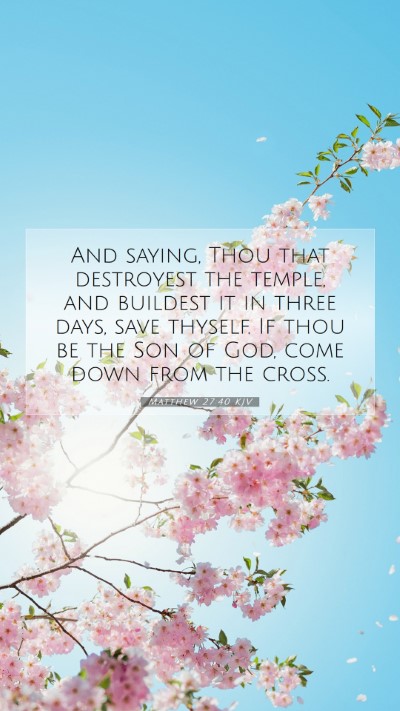Bible Verse Meaning and Interpretation: Matthew 27:40
Matthew 27:40 states, "And saying, Thou that destroyest the temple, and buildest it in three days, save thyself. If thou be the Son of God, come down from the cross."
Overview and Context
This verse captures a moment during the crucifixion of Jesus, where onlookers, including the chief priests and those crucifying Him, mock His claim of divine power. They reference Jesus' earlier statement about destroying the temple and raising it in three days, a claim misunderstood by them as a literal challenge rather than a prophetic reference to His death and resurrection.
Commentary Insights
- Matthew Henry: Henry emphasizes the moral and theological significance of this mocking. It reflects the rejection of Jesus by the very people He came to save. Their taunts reveal their lack of understanding of His mission and the deeper spiritual truths behind His resurrection.
- Albert Barnes: Barnes provides insight into the implications of their words, noting they demonstrate a glaring contrast between earthly perception and divine reality. He suggests the sarcasm highlights a failure to recognize the true nature of Jesus' kingship and His redemptive purpose.
- Adam Clarke: Clarke elaborates on the ignorance of those jeering at Jesus. Their challenge, thus, illustrates humanity's tendency to demand physical demonstrations of faith, rather than embracing spiritual truths. Clarke also mentions how they unwittingly testify to Jesus' true power by referencing His earlier works.
Meaning and Application
Matthew 27:40 serves as a powerful reminder for believers concerning the nature of faith. In this moment of extreme suffering, Jesus embodies silent strength, refraining from vindication. The taunts of the crowd invite modern readers to reflect on their understanding of faith and the expectations placed on divine intervention in times of distress.
Faith and Understanding
This verse encourages Christians to confront their own expectations of God. Are we similar to the crowd, seeking tangible miracles, or can we recognize the deeper works of God in our lives? Jesus’ refusal to respond to their challenge points toward a greater purpose, one that extends beyond physical deliverance.
The Cross and Its Significance
The reference to the temple signifies not only Jesus' physical resurrection but also the establishment of a new covenant—God dwelling among His people through Christ, rather than in a physical structure. Thus, the crowd’s misunderstanding reveals a profound disconnect between worldly wisdom and divine revelation.
Bible Verse Explanations
For those seeking deeper Bible verse explanations and Biblical exegesis, the analysis of Matthew 27:40 offers an opportunity to explore themes of mockery, faith, and misunderstanding, as well as the differentiation between human perception and divine truth.
Additional Cross References
- John 2:19-22: Jesus speaks of destroying the temple and raising it in three days, which is directly relevant to the mocking in Matthew 27:40.
- Mark 15:29-30: A parallel account of the mockery faced by Jesus during the crucifixion.
- Luke 23:35: Another version of the taunts directed at Jesus, sharing the ridicule He endured.
Conclusion
As we explore this pivotal moment in the New Testament, we gain valuable Bible study insights into the nature of sacrifice, mockery, and redemption. Each verse contributes to a broader understanding of Jesus’ mission, providing rich material for Bible study groups and individual reflection.
This comprehensive Bible verse commentary aims to enhance one's understanding of Scripture and apply Bible study lessons to personal faith journeys. As we analyze these complex themes, let us walk away with a deeper appreciation of the sacrifices made on our behalf and the profound truths embedded within the scripture.


